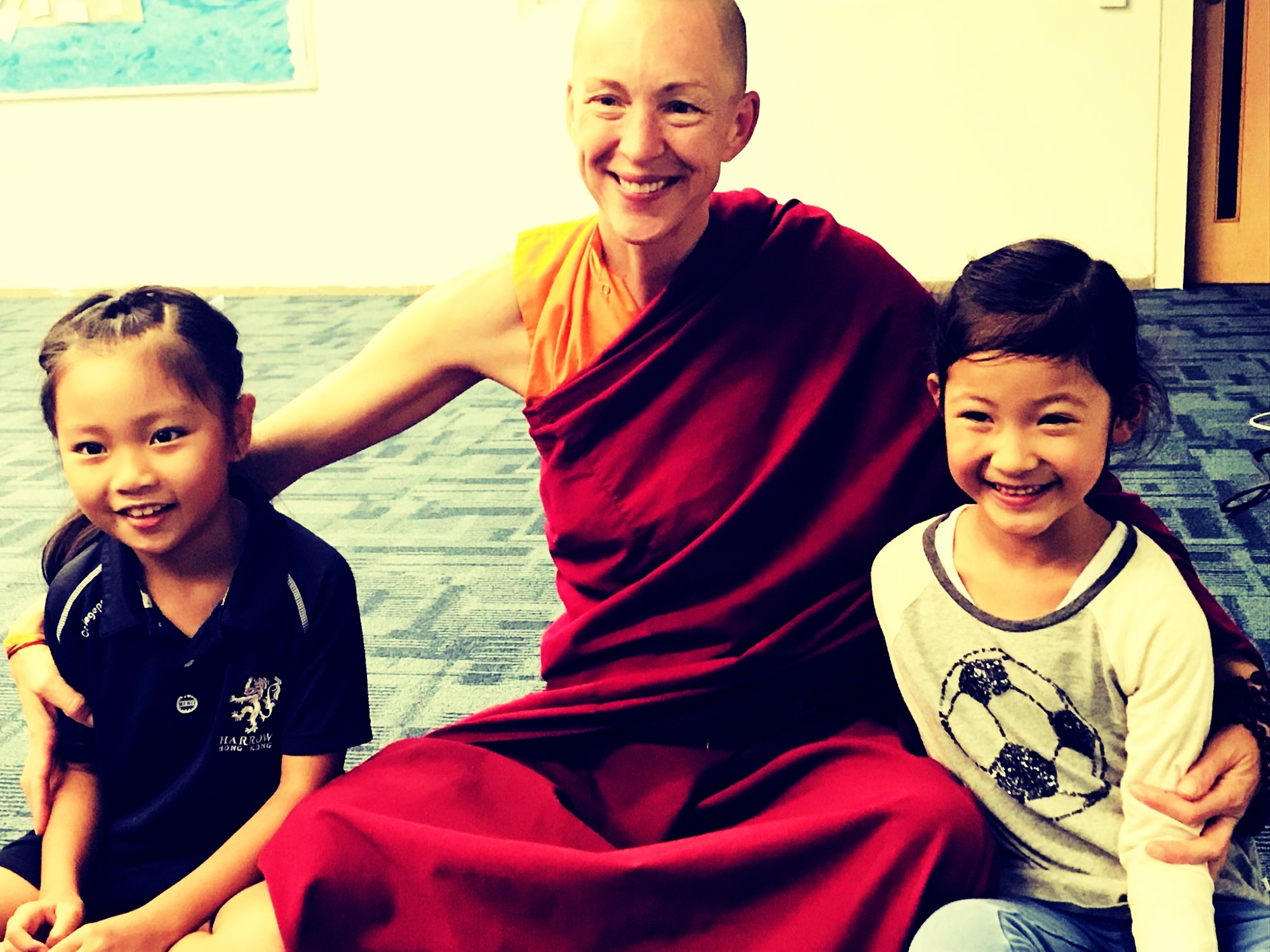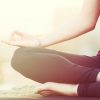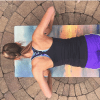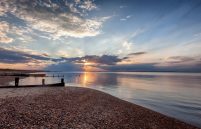
Its not everyday you get to walk down to your local cafe and interview an internationally acclaimed philanthropist, author and Buddhist nun. Being a yoga teacher I have to admit that I have been looking forward to this meeting Emma Slade for sometime. I already knew that she was a keen yoga practitioner, and that in its way, it has played a part in her finding the Buddhist way. I also knew that Emma had not always been on this path, so was looking forward to the insights she could provide, having had the experience of living as a lay person (Investment Banker) too.
I don’t normally like to grab a coffee in Costa, there is nothing much wrong with it taste wise, its just that I prefer to support the local businesses in and around Kent. However the Costa Coffee in Whitstable, (where I teach teach yoga) and where I found myself for this interview feels different, more homely, more Whitstable really.
Having not met Emma Before, I wasn’t really sure what to expect. This is not the place to discuss her back story at length, as that has been done before elsewhere. It suffices to say that after spending a number of years working her fingers to the bone for “The Man” (maybe it will be “The Woman” one day), she had a number of life changing experiences that made her re-evaluate the direction she was following. This strong sense of authentic purpose shined out of Emma the moment that we met and continued as our conversation flowed:
What’s a day in the life of Emma Slade like then?
It’s not very monotone right now. When I was doing a lot of intense practice it was quite monotone. There was one main focus and at the moment there are many aspects to it. There are three elements to my life: a nun, the founder of a charity and a mother.
Everyday I start with my breathing practice, followed by prayers and some meditation to keep my mind tied to my spiritual practice so I don’t stray away from it. Then I dedicate my practice to all beings and hope that they become completely enlightened.
The majority of my daily activity centers around the charity that I run (Opening Your Heart to Bhutan). Either I’ll be doing fundraising, public speaking, or sorting through the many emails detailing project progress from Bhutan.
I also parent my son. Who is nearly 12 years old now. I’m still cook the meals, wash the clothes and take him places!
Do you ever feel tempted to emigrate to Bhutan?
In the end you’ll find me in Bhutan. I’m hoping that if we have a conversation next year you will have to come to Bhutan to meet me. At the moment I go back and forth to, usually with the charity and for my monastic training. I’ve been ping-ponging for a while now, mainly because of the duty I have to my son. I can imagine that as he get’s older, the balance will begin to shift and you’ll find me in the mountains of Bhutan more often.
What’s your favorite food?
I am just grateful for anything that comes up. I think you need to get a healthy balance between not obsessing with food and keeping the body healthy. I think we should be more interested in what we put into our mind rather than our body.
How important is yoga in your everyday?
Yoga in its huge and profound definition encompasses so many paths and methods.
The physical methods, the sun and the moon, the “ha” and “tha”, the male and the female bringing the energies together. The physical movement of the body and it’s balancing I practiced for a long time and I think they are absolutely joyful. Pure physical joy, I benefited and have seen the way that it can help people transform their embodiment (what it is to be in their own bodies and the joy of being in their bodies). I don’t practice any physical yoga anymore. As part of my monastic training I had to do 100 and 10 thousand prostrations, after doing that many you don’t even want to walk let along break into a headstand! I feel as if the balancing and cleaning of my body is pretty much done and now it’s about the mind. I look back at my yoga practice with giggling joy. I don’t feel the need to do it anymore, but I enjoyed that I did do it. It was good while it lasted but I’m 51 now. It’s better that I work with my mind.
There is an element in the yoga texts that suggests that there is the subtlest aspect of the mind that is not impermanent and that is the area that we should be dealing with.
The body ultimately is impermanent. We try and forget it and deny it. Yoga states that very clearly, the importance of the cultivation, awareness and connection to the mind. There is an element in the yoga texts that suggests that there is the subtlest aspect of the mind that is not impermanent and that is the area that we should be dealing with.
The more advanced the physical posture the more you have to have a sense of humour. It’s the same with the mind the more profound the practice the more you have to have a sense of humour. You could get competitive, judge or look for results. It’s important that people become empowered. Empower them with the knowledge to practice on their own. I think it’s hard to find meditation teachers in the West that’s why I go to Bhutan.
The cause and conditions in Whitstable are very different to Bhutan. For good or for bad that changes things. It’s hard to understand that unless you have spent a lot of time in a Buddhist culture.
How important is retreating to you?
Retreat is very important. But why you go into a retreat is equally important. From a Buddhist perspective you should ask yourself the question why are you doing anything? My rinpoche told me that some monks go into retreat just to get away from people and have more time to focus on their practice. The opportunity to live a simple life. Gathering your energies inward rather than spreading than outward can be helpful for anyone whether you are a monk, nun or anyone.
What do you think of silent retreat?
There is always a combination of doing serious practice and being joyful, being thankful for the people around you and for your teachers. I’m very serious but I don’t want to lose my joyfulness.
How’s are your current projects going with Opening Your Heart to Bhutan?
We’ve raised £200,000 and that’s largely off the back of the book (Set Free). We’ve helped far more people than I ever imagined. It’s been extraordinary.
All of your projects are important but are their any that are close to your heart?
I have chosen to focus on working with children and adults with special needs. Sometimes I know their families and backgrounds and this is very close to my heart. I needed something bite size that I could really make a difference with and so this has become my focus. You have to stay close to who you are helping and then you know exactly what they need.
When did you decide to write a book?
One of my students (Michelle) suggested that I write a book. She mentioned it at the end of yoga session and that planted the seed. I asked my Lama and was very nervous because it felt like it might be egotistical. He said it sounded good, to inspire others would be a valuable objective, and so I got the go ahead. The book is an agent to hopefully allow people to reflect, wake up a little and raise funds for the charity. I hoped that it would be an accessible book, that perhaps touched on profound things but with lightness.
Unless you have experience of suffering you won’t understand compassion
I have tried to write it in a way that you realise that all humans have encountered difficulty and seek happiness. Unless you have experience of suffering you won’t understand compassion. It’s hard to empathise with people if you hadn’t suffered. It would be abstract. If we have suffered we can have sensitivity, some people have found that they hopefully learn through suffering.
Some people come to yoga to learn through difficult times.
Were you drawn to Buddhism from a young age?
It was always there. My grandfather had a buddha statue, and I always found it very interesting. I was fascinated by its seated position, with its hand’s on the lap and eye’s half open. Is the Buddha doing or not doing?? These figures of the Buddha are here to inspire us, however a lot of people feel like they are failing in meditation if they attach themselves to this image. I think we have to bear in mind that this is the image of the “Olympic Budda”. It should almost come with a health warning, that he didn’t achive this over night, it took around 45 years. It doesn’t matter if you don’t physically look like the figure or are as peaceful as this image. Try to remember that it’s there to inspire us to keep going. It’s the Dame Kelly Holmes of meditation.
Do you think we are closer to the light or further away than ever?
I have decided to follow the path of the Buddha, the texts and the sangha (community of Buddhists) These are the three key elements of my monastic life. Within that we seek to develop compassion for all beings, which is not easy. Then we seek to develop wisdom which in the Buddhist context is something very specific – understanding the nature of reality, so it’s quite scientific in its focus. The last couple of years with the founding of the charity has been very much about seeking to understand compassion in action.
I find that in the West people have kindness and compassion and in the East people have kindness and compassion.
I think one of the most annoying things about Buddhism is that when you look back at the writings of the Buddha two and a half thousand years ago, you feel he could be talking about the present, it’s like groundhog day! As if humans have been going round and round in circles for ever suffering from the same problems. Having said that, I find that in the West people have kindness and compassion and in the East people have kindness and compassion. I find in the West people have anger and greed and in the East people have anger and greed.
There is light and darkness everywhere. That’s just how it seems to be. One of the nice things about running the charity is it allows me to connect with people from all over the world. These people understand that happiness doesn’t come from anger, it comes from being kind. When they start to connect with each other they feel that they are not alone. That’s why social media is tricky but helpful at points. One has a tendency to categorise the West and East, they is light and dark everywhere. Travelling between the East and West quite fluidly you see people that are incredibly kind, people that are somehow intuitively kind, that seems mind boggling to me.
For a person living in the UK, working 9-5pm, with a couple of children, what would be your advice to bringing more compassion into their life?
First of all it sounds like the person is quite busy. I think that what is tricky from a day to day basis is that we humans can feel quite strained. At that point the risk is that they might snap. When people are doing a lot, it’s hard to not snap and your probably doing far more than the human body was designed for. Recognize that you are doing a lot and try to refrain from creating any suffering. Sometimes the notion of self-compassion, is realising that you have no reflective space and you lose the sense that you are consciously deciding about your life. Self-compassion might be just lying down and doing nothing for half an hour. It doesn’t have to be any other thing. From a Buddhist point of view, the act of renunciation, this is understanding what it is you need, letting things go, be free of certain activities and give yourself space so you can reflect on your life. So that you life is perhaps heading in the right direction even in the underlying madness of daily life. From a Buddhist point of view it’s fine to be compassionate but it’s wiped away from one moment of anger. This is why the Dalai Lama first of all asks us to refrain from suffering. I don’t think the human being is mentally or physically at it’s optimum when it’s at its busiest. It takes real courage to go against the tide and make some changes… The way you nourish the wholeness of the human being comes in different forms.
Emma Slade’s Book Set Free is available to purchase on Amazon now. All profits from the sale of this book are being donated to Opening Your Heart to Bhutan.










Super cool
Hi Eugenie,
I am glad you enjoyed the interview. If your interested to know more about Emma’s book and charity please check out the links at the end of the article.
Peace & positivity
Laura
Thanks I have really enjoyed this article
Hey Vito,
I am really glad that you enjoyed the article. If you would like to learn more about Opening your heart to Bhutan please check out the link at the end of the post.
Namaste
Laura
Please can we have more posts like this one
Hi Willis,
Yoga Wellbeing is going to dedicate more time on the blog to interviewing inspiring characters. Please just let us know if you have any suggestions we are always open to any suggestions.
Peace & light
Laura